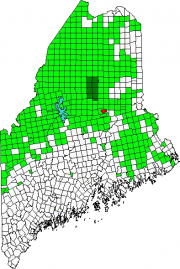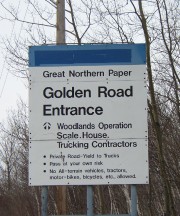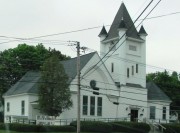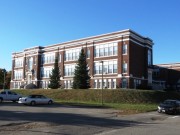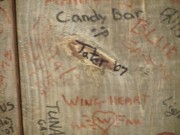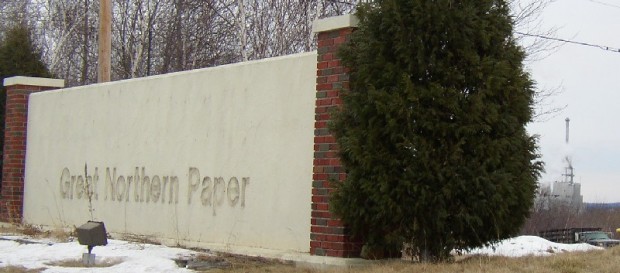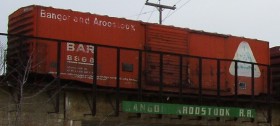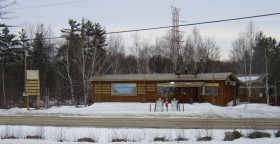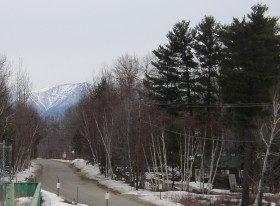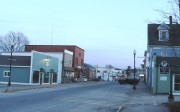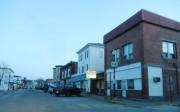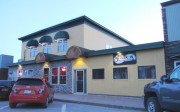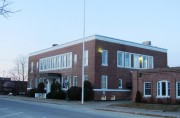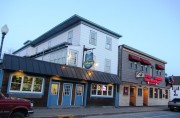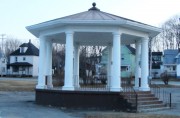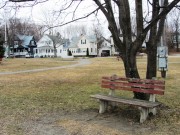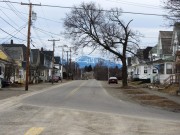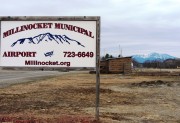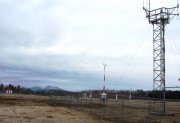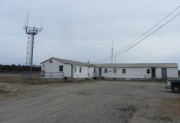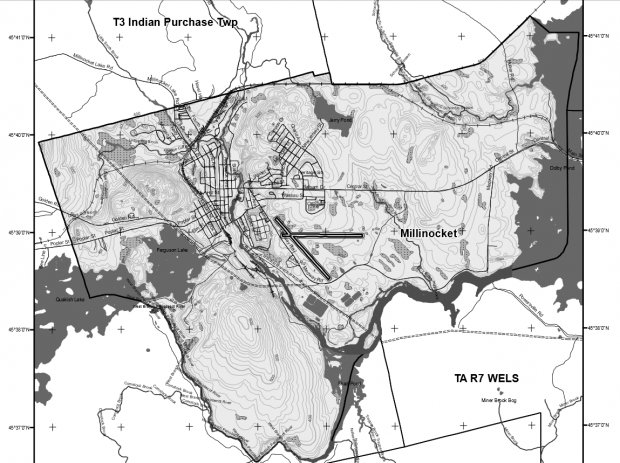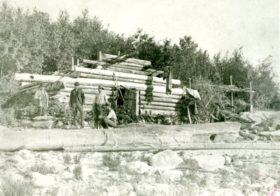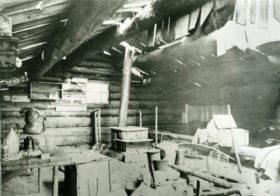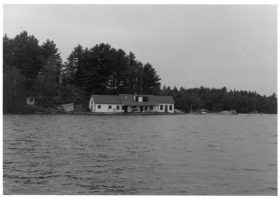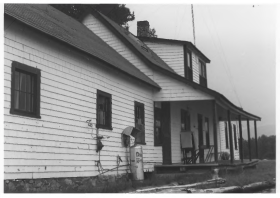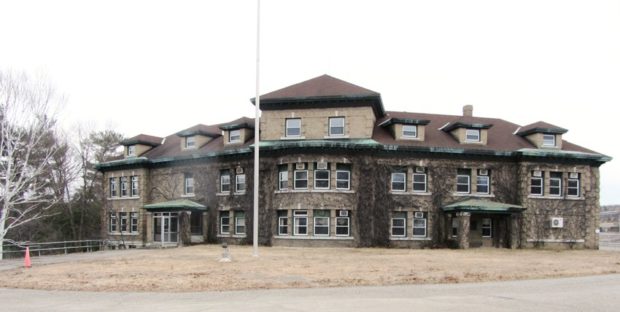
| Year | Population |
|---|---|
| 1970 | 7,742 |
| 1980 | 7,567 |
| 1990 | 6,956 |
| 2000 | 5,203 |
| 2010 | 4,506 |
| Geographic Data | |
|---|---|
| N. Latitude | 45:38:52 |
| W. Longitude | 68:42:14 |
| Maine House | District 143 |
| Maine Senate | District 5 |
| Congress | District 2 |
| Area sq. mi. | (total) 18.3 |
| Area sq. mi. | (land) 15.9 |
| Population/sq.mi. | (land) 293.4 |
| County: PenobscotTotal=land+water; Land=land only | |
[mil-ih-NOK-eht]is a town in Penobscot County, incorporated on March 16, 1901 from a portion of Indian Township Number 3, the remainder of which borders the town on the north and west.
The name, shared with a lake and stream, has been interpreted as “dotted with many islands,” though Bond believes “at the deep marsh grass” is the better choice. The first settlers were Thomas Fowler and his wife in 1830 and, eventually, their eight children who also settled there.
In 1899, the potential for pulp production and electric power stirred the Great Northern Paper Company to build a mill at the direction of Garret Schenck, then manager of the Rumford Falls Paper Company. The forest products industry was essential to the town’s creation and critical to its survival. With changing demands for paper, the Company was acquired by Georgia-Pacific Corporation in 1990 and ceased operating its massive mill complex in 2014.
Millinocket is the gateway to Baxter State Park, its famed Mount Katahdin, the final destination of northbound hikers of the Appalachian Trail.
The Appalachian Trail Cafe, established in 2007, and the AT Lodge are both located downtown, catering to hikers and their families celebrating the journey. Ceiling tiles are reserved for trail name autographs for each year since 2007.
After paper making, the second element in the area’s economy was the attraction of people to the Park, along with hunting and recreation in the nearby north woods.
The Katahdin Woods and Waters National Monument, established in 2016, may contribute to improving the local economy.
The company-owned Golden Road is a major route to the woods.
As a mark of changing times and ownerships, the “Great Northern Paper” text has been removed from the solid structure announcing the old company’s name.
Great Northern Paper Company and the Bangor and Aroostook Railroad have been institutions key to local economic life in Millinocket for many years.
Several labor unions were formed here, including the Papermakers’ Union (1902), the Local Firemen’s Union (pre-1903), and the Federal Labor Union (1903). While the paper mill has dominated the town, as in East Millinocket, the declining employment in the industry has contributed to the steady loss of population over the past forty years – 42% in that period. As these evening photos show, the downtown area is still vibrant.
George W. Stearns was one of the town’s most prominent residents: superintendent of schools, chair of the school board and of the board of selectmen, its first judge, a State Representative and State Senator, and member of the Governor’s Council. The high school is named in his honor.
Millinocket is the birthplace of U.S. Representative,and former mill worker, Michael H. Michaud. Clyde Sukeforth, born in Washington, Maine, played for the Great Northern Paper Company baseball team in Millinocket before hitting the big leagueswith the Cincinnati Reds.
Form of Government: Council-Manager
Additional resources
*Thanks to Trudy Wyman, Curator at the Millinocket Historical Society.
Chadbourne, Ava Harriet. Maine Place Names and The Peopling of its Towns.
Bond, C. Lawrence. Native Names of New England Towns and Villages.
Duff, Betty. Class and Gender Roles in the Company Towns of Millinocket and East Millinocket, Maine, and Benham and Lynch, Kentucky, 1901-2004: a Comparative History. (Cataloger Note: Thesis (Ph.D.) in History–University of Maine, 2004.) [University of Maine, Raymond H. Fogler Library, Special Collections]
Great Northern Paper Company. Records, 1889-1992. (Cataloger Note: 60 boxes. Records organized into five series: I. Executive and administrative records. II. Financial records. III. Production and sales records. IV. Department reports. V. John E. McLeod papers. Series I organized into six sub-series: 1. General and special files. 2. Records of Madison mill. 3. Contracts for materials, supplies and services. 4. Labor. 5. Publications. 6. Photographs. Kept at Fogler Library’s offsite storage facility. One week’s notice required for retrieval. Collection includes correspondence, subject files, publications, contracts for material and labor, maps and plans, photographs and production record.)
Laverty, Dorothy Bowler. Millinocket; Magic City of Maine’s Wilderness. Freeport, Me. Bond Wheelwright Co. 1973.
Laverty, Dorothy Bowler. So you live in Millinocket? Millinocket, Me. D. B. Laverty. c1989 (Bangor, Me. Furbush-Roberts Printing Co.)
Maine. Department of Agriculture, Conservation and Forestry. Maine Forest Service. Forest Policy & Management. “Forest Operation Notification & Harvest Location Map, March 2014.” http://www.maine.gov/dacf/mfs/rules_regs/maps/FONS_tabloid/FONS_tabloid__Millinocket.pdf (accessed May 4, 2014)
*Maine. Historic Preservation Commission. Augusta, Me. Text and photos for the Ambajejus Boom House are from National Register of Historic Places: http://pdfhost.focus.nps.gov/docs/nrhp/text/73000145.PDF and http://pdfhost.focus.nps.gov/docs/nrhp/photos/73000145.PDF [Based on the 1972 National Register application.]
McCauley, Brian. The Names of Maine: How Maine Places Got Their Names and What They Mean.
Millinocket, Maine 50th Anniversary 1901-1951. Maine. 1951.
Millinocket, Maine: 1901-2001. Millinocket, Me. centennial Committee. 2001. [University of Maine, Raymond H. Fogler Library, Special Collections]
Log Boom House images courtesy of Special Collections, Raymond H. Fogler Library, DigitalCommons@UMaine, MS 210, Great Northern Paper Company Records https://digitalcommons.library.umaine.edu/spec_photos/2314 (accessed March 5, 2018)
National Register of Historic Places – Listings
Ambajejus Boom House
[about 11 mile Northwest of Millinocket and Ambajejus Lake] The first Boom House was built at Ambajejus around 1835. This may have been the building that Henry David Thoreau referred to in 1846: “Here was the site of an old loggers camp…now overgrown with weeds and bushes.” There was a log Boom House at the site in 1865.
The present Boom House was built about 1907 and was used by the Great Northern until the fall of 1971 when the West Branch drive was discontinued. The white and green shingled building is approximately 100 feet long by fifteen feet wide. It is about ten feet from the lake and is divided into three sections. [Kenneth M. Morrison photos]
Once logs were collected the boom was towed, at first by hand and then by steamer, down the chain of Lakes (Ambajejus, Peinadumcobk, North Twin Lakes) to the North Twin Dam where they were sluiced to the Great Northern’s mills at Millinocket and East Millinocket.*
Archaeological Sites Nos. 122–14 10/31/9, 122–16, 10/31/9, 122–22 10/31/9, 122–4a 10/31/9, 122–6, 10/31/9, 122–8 10/31/9, 134–8 10/31/9, 134–9 10/31/9. Addresses Restricted, Penobscot Headwater Lakes
Munsungan-Chase Lake Thoroughfare Archaeologically District, Millinocket Lake [According to Brian McCauley, “munsungan” is the Abenaki word for “humped up island.”]


